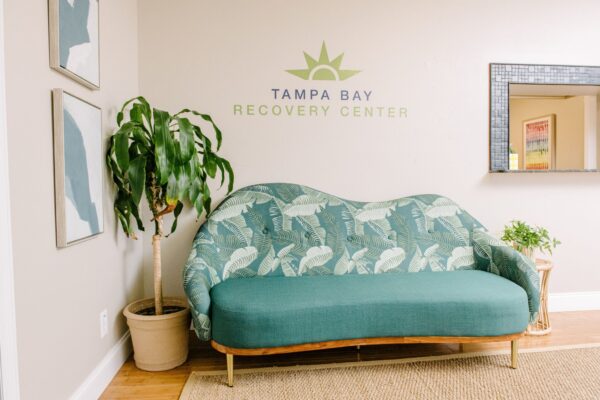EMDR Therapy
EMDR therapy in Tampa is a relatively new therapeutic method that can have lasting benefits for those struggling with substance use disorders. In previous eras, medical experts assumed that severe emotional pain could only be healed over time. EMDR therapy suggests that the mind can in fact heal itself from trauma associated with substance abuse less gradually. Fortunately, Gulf Coast Recovery Center is proud to offer EMDR therapy as part of its Partial Hospitalization Program (PHP) and our Intensive Outpatient (IOP) programs.
Are You Ready To Change Your Life?
Take Action Now.
What is EMDR Therapy?
EMDR stands for Eye Movement Desensitization and Reprocessing. It is a therapeutic approach designed to help people process their most traumatic experiences and distressing memories.
Perhaps the most distinctive feature of EMDR therapy in Tampa involves something called bilateral stimulation. Bilateral stimulation occurs through eye movements, hand taps, or auditory tones, all of which mimic the natural processing that occurs during REM (rapid eye movement) sleep.
Because EMDR is not a medication, its side effects are mild but unpredictable. That said, it is recommended by organizations like the World Health Organization (WHO) and the American Psychiatric Association (APA). Many medical professionals point to EMDR therapy as a safe alternative to prescription medications.
However, the side effects of EMDR therapy are like those of other forms of psychotherapy. They include heightened emotions or physical sensations during therapy sessions and possible lightheadedness. Fortunately, such side effects tend to resolve themselves as treatment progresses.
What Does Our EMDR Therapy in Tampa Treat?
EMDR therapy in Tampa is an extensively researched and effective psychotherapy method. Developed by Francine Shapiro in the late 1980s, EMDR therapy has since gained international recognition for its effectiveness in treating symptoms of trauma, including post-traumatic stress disorder (PTSD), childhood abuse, and life-threatening accidents. It has also been shown effective in the treatment of substance use disorders.

How Can EMDR Help Addiction?
EMDR therapy has been used to treat addiction by targeting the underlying traumas that contribute to substance abuse. Just as EMDR helps an individual work through a traumatic event, it can help the patient focus on their addictive behaviors and the emotions behind those behaviors.
Over time, the patient starts to let go of the intense or negative feelings associated with their memories of alcohol and drug use. They also start to learn effective coping mechanisms for dealing with and overcoming their personal addiction triggers.
By reprocessing these traumatic memories and examining their triggers, patients experience a reduction in the frequency and severity of cravings, promoting an easier path to recovery.
How Can EMDR Help Mental Health?
In addition to substance use disorder, EMDR therapy is known to be effective in the treatment of the following mental health disorders:
- Post-Traumatic Stress Disorder (PTSD). EMDR is extensively used to address the traumatic experiences underlying PTSD, reducing flashbacks, nightmares, and hyperarousal.
- Anxiety. EMDR can alleviate symptoms of generalized anxiety disorder, social anxiety, and panic disorder.
- Depression. EMDR can be effective in treating negative self-belief and other depressive symptoms related to trauma.
- Phobias. EMDR helps patients reprocess memories associated with specific phobias, reducing the intensity of the fear response.
When administered by a trained therapist who can tailor the therapy to the patient’s individual needs, EMDR therapy in Tampa treats mental health disorders by facilitating the processing and healing of distressing memories.
The ways in which EMDR helps with mental health are:
- Trauma Processing. EMDR therapy helps patients process traumatic memories, reducing their emotional intensity and all associated distress.
- Desensitization. EMDR decreases the emotional reactivity or triggers linked to distressing memories.
- Cognitive Restructuring. EMDR helps reframe negative beliefs into more positive, adaptive ones.
- Emotional Regulation. EMDR therapy aids in the management of strong emotions, promoting better emotional control and well-being.
- Reduction of Symptoms. EMDR can alleviate the most severe symptoms of anxiety, depression, and PTSD.
- Self-Empowerment. EMDR promotes a sense of control and empowerment over one’s thoughts and emotions. This leads to great confidence and self-sufficiency.
What To Expect During an EMDR Therapy Session
During an EMDR therapy session, which typically lasts 60 to 90 minutes, a trained therapist guides the patient through a series of procedures. EMDR therapy traditionally follows an eight-phase approach, which includes:
- History-taking
- Preparation
- Assessment
- Desensitization
- Installation of positive beliefs
- Body scan
- Closure
- Reevaluation
The EMDR therapist helps the patient identify and target certain distressing memories, negative beliefs, and related emotions. They then facilitate the reprocessing of these memories.

Benefits of EMDR Therapy
The main benefit of EMDR therapy is that it can help people reprocess their traumatic memories so that they grow less distressed in reaction to them, thus reducing the impact of these memories on their daily lives. Another benefit is that more positive beliefs are introduced, replacing the negative ones associated with trauma.
Some of the additional benefits of EMDR therapy include:
- EMDR is a drug-free therapy method.
- EMDR can help a person better understand the reasons for what led to their behavior, including addictive behaviors.
- It can be easier to process and overcome trauma with EMDR therapy when the person finds it difficult to talk about their trauma candidly.
- The overall duration of addiction treatment can be shortened with the incorporation of EMDR therapy.
How We Offer EMDR Therapy at Gulf Coast Recovery Center
At Gulf Coast Recovery Center, EMDR therapy is offered as part of our Partial Hospitalization Program (PHP) and our Intensive Outpatient Program (IOP). Our compassionate therapists utilize proven methods to help our patients focus on specific adverse events while learning to relax. Once the patient focuses on a single part of their trauma, the therapist employs different techniques to help them deal with the issue.

Medically Reviewed
Medically Reviewed by
Jennifer Strong, LMHC
Written by Gulf Coast Recovery Staff Updated on January 12, 2024
Get Help Now
Rehab in Tampa, FL
Mental health disorders and addiction can severely impact your quality of life. But there is hope for recovery. Call Gulf Coast Recovery today to begin treatment with us.
Facility Image Gallery
Find Effective EMDR Therapy In Tampa Today
If you are looking to see past a traumatic event that led you to abuse substances, Gulf Coast Recovery Center’s EMDR therapy in Tampa may be right for you. We offer personalized addiction treatment plans tailored to your needs in a supportive and safe environment. Contact us today for more information.









 They recognized me as an individual. This is not a place that has cookie-cutter treatments that they attempt to force every patient to fit into. They realize that different people with similar problems respond differently, some better to one type of treatment and some not so much. I feel like that is why I succeeded here.
They recognized me as an individual. This is not a place that has cookie-cutter treatments that they attempt to force every patient to fit into. They realize that different people with similar problems respond differently, some better to one type of treatment and some not so much. I feel like that is why I succeeded here.



